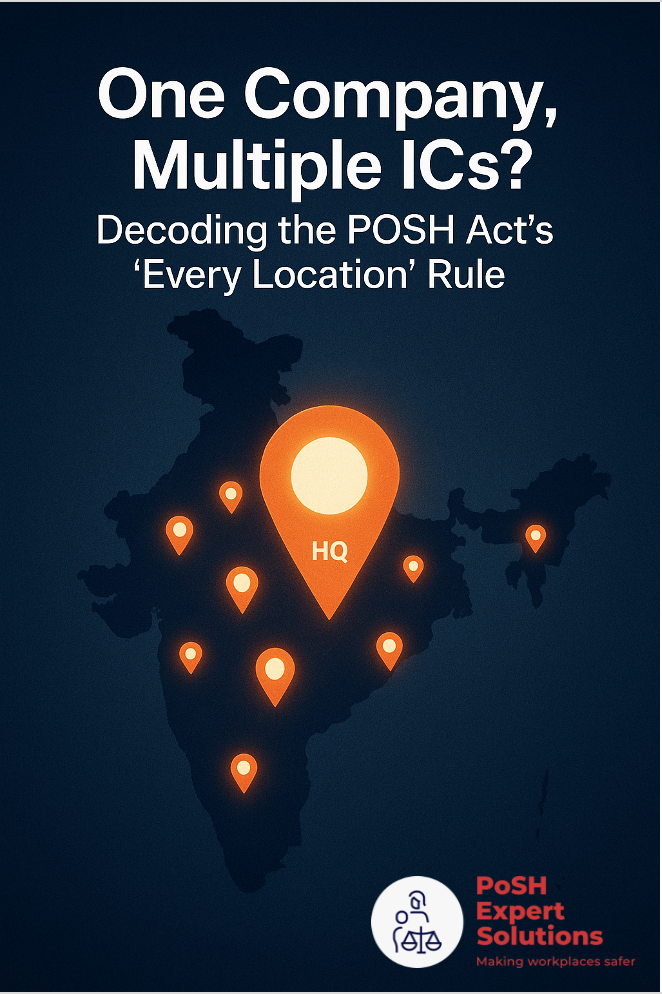Can an Indian Internal Complaints Committee (IC) handle overseas Sexual Harassment?
- Reetika Gupta
- Feb 11
- 4 min read
Multinational corporations (MNCs) often face complex situations regarding workplace conduct, especially when employees travel internationally. A common question arises: if an Indian employee experiences sexual harassment by a colleague in another country while on company business, can the India-based Internal Complaints Committee (IC) address the complaint? The answer, while not a simple yes or no, leans towards yes, but with important nuances.
The Core Principle: Extraterritorial Application of the POSH Act
The Sexual Harassment of Women at Workplace (Prevention, Prohibition and Redressal) Act, 2013 (POSH Act) in India primarily focuses on incidents within the traditional workplace. However, the definition of "workplace" has been broadened significantly through judicial interpretations and the Act itself. While the “workplace” in the Vishaka Guidelines was confined to the traditional office setup with a clear employer-employee relationship, the Act goes much further. The POSH Act includes:
organisations, departments, offices, branch units, etc., in the public and private sector, organised and unorganised;
hospitals, nursing homes, educational institutions, sports institutes, stadiums, sports complexes, and
any place visited by the employee during the course of employment, including transportation.
This expansive definition is crucial for understanding the extraterritorial applicability of the Act.
Scenario 1: Harassment During a Business Trip
If an Indian employee is sexually harassed by an overseas colleague during a business trip organised by the company, the Indian IC can likely take cognisance of the complaint. The harassment occurred during the course of employment, even though it was outside India. The company's duty of care towards its employees extends beyond geographical boundaries, especially when they are traveling on company business. In such cases, the employer should facilitate a seamless investigation and provide appropriate support to the victim.
Scenario 2: Harassment in an Overseas Office
If an Indian employee is temporarily or permanently posted to an overseas office, the situation is more complex. While the POSH Act might still apply, the IC’s enforcement capacity is limited by local laws. The most effective approach would be coordination between the Indian IC and the local grievance redressal body, ensuring that both jurisdictions address the complaint adequately while respecting local legal frameworks.
Scenario 3: Harassment During a Company-Sponsored Event
When harassment occurs at a company-sponsored conference, seminar, or networking event abroad, the employment connection remains clear. The Indian IC can likely handle such complaints, particularly if participation in the event was a requirement of employment. Companies should ensure that their policies explicitly include such scenarios for clarity.
Scenario 4: Virtual Harassment
With remote work on the rise, online harassment is a growing concern. If an Indian employee is harassed by an overseas colleague via digital communication, the IC can likely investigate, as the harassment affects the employee’s work environment regardless of geographical location. Virtual misconduct, including inappropriate messages, video calls, or persistent unwelcome behaviour, must be addressed with the same seriousness as in-person incidents.
The Principle of "Effective Control"
A key principle in handling cross-border harassment cases is "effective control"—the ability of an employer to investigate, discipline, and implement corrective measures. The best-suited forum to address a complaint is often where the accused can be effectively disciplined. Employees generally have two reporting options:
Their employer’s IC: The Indian IC has a duty of care towards its employees and can provide immediate redressal, support, and recommendations.
The organisation where the accused is employed: This forum has direct authority to impose disciplinary actions, including suspension or termination, ensuring that justice is served effectively.
Companies should establish formal agreements with global offices and partner organisations to streamline cooperation in such cases. This ensures that the complaint is not dismissed due to jurisdictional conflicts but is handled efficiently.

Key Considerations and Best Practices for MNCs:
Company Policy: MNCs should have a clear and comprehensive policy on sexual harassment that explicitly addresses incidents occurring outside India. This policy should outline the process for reporting such incidents, the jurisdiction of the IC, and the mechanisms for cooperation with local authorities.
Jurisdictional Challenges: Enforcement of the POSH Act's recommendations can be difficult in a foreign jurisdiction. MNCs should be prepared to work with legal counsel in the relevant country to navigate local laws and regulations.
Dual Reporting: Employees should be given the option to report the harassment both to the Indian IC and to the equivalent body in the country where the incident occurred. This ensures a thorough investigation and provides multiple avenues for redressal.
Inter-Company Cooperation: MNCs should establish clear protocols for communication and cooperation between different branches and offices when dealing with cross-border harassment complaints.
Employee Support: Providing comprehensive support to the victim, including legal assistance, counselling, and relocation if necessary, is crucial, regardless of where the incident occurred.
Training and Awareness: Regular training programs for all employees, including those traveling internationally, are essential to raise awareness about sexual harassment and the company's policies and procedures.
Conclusion:
While the POSH Act primarily focuses on incidents within India, its scope extends to certain extraterritorial situations, particularly when the harassment is connected to the employee's work and occurs during the course of employment, such as during business trips or company events. MNCs operating in India should proactively address the issue of overseas sexual harassment by implementing robust policies, establishing clear reporting mechanisms, and providing comprehensive support to affected employees. They should also be prepared to navigate the complexities of international law and cooperation to ensure a safe and respectful work environment for all their employees, regardless of location. It is always advisable to consult with legal experts specialising in labor law and cross-border issues for specific guidance.




Comments